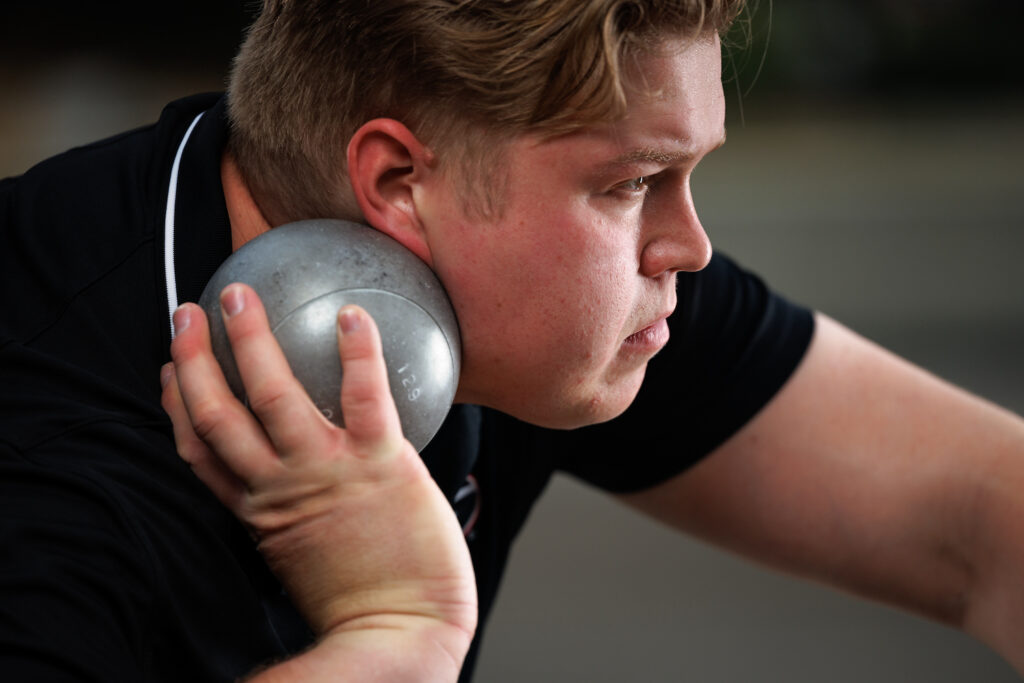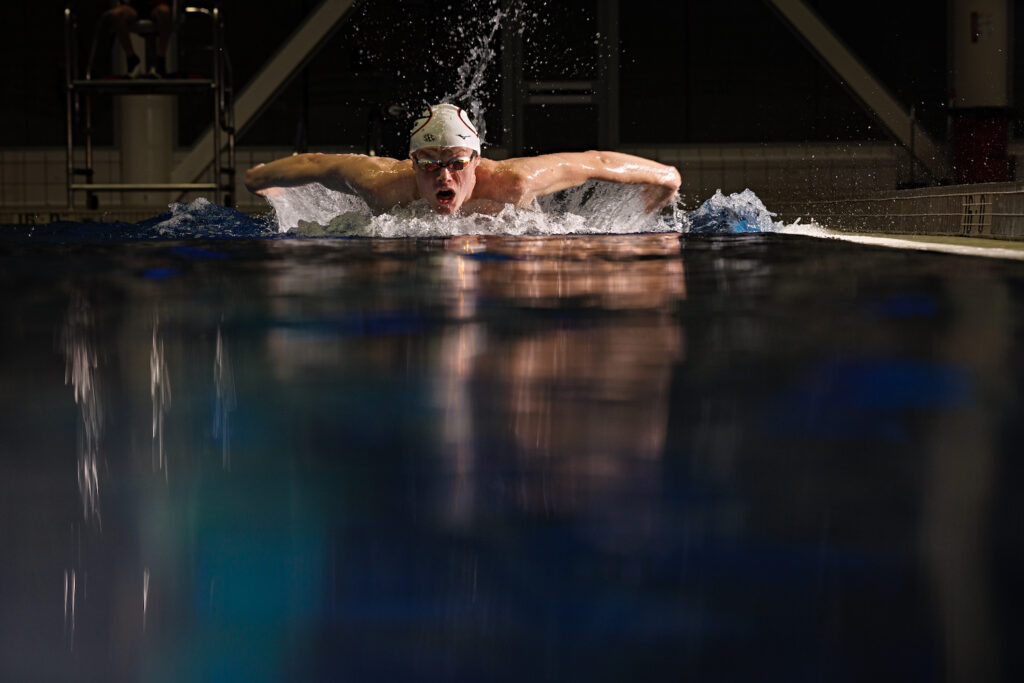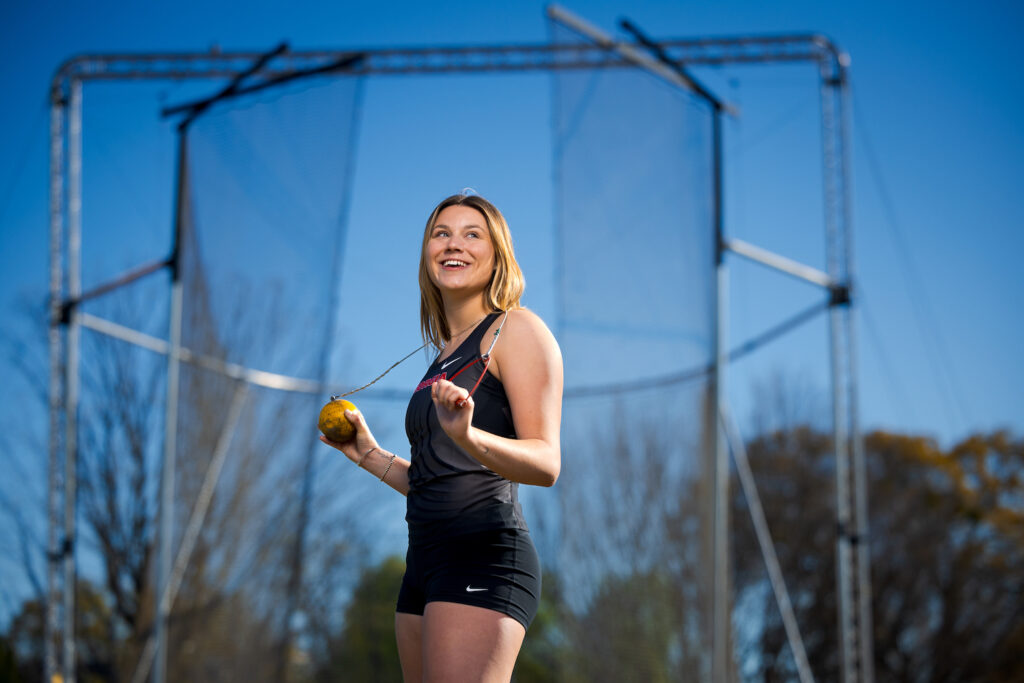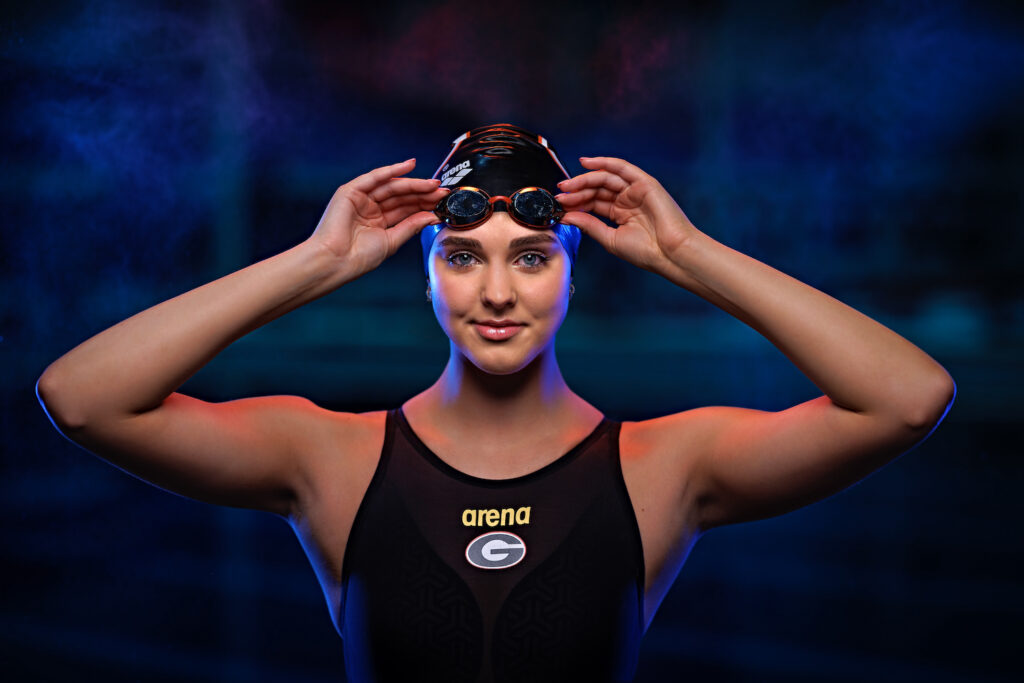By the time the world’s athletes converge in Paris in July for the 2024 Summer Olympic Games, each of them will have poured years of early-morning practices, hard work and missed social events into becoming their best.
For four Terry College of Business students hoping for a spot on the global stage this summer, that dedication shaped their athletic life and also influenced their academic and professional pursuits. Whether on the field or in the pool or classroom, it’s hard to turn off Olympic drive.
Cool on the deck, ‘piranha’ in the pool
When Rachel Stege, a third-year finance major from Naperville, Illinois, graduated from high school, she was one the best distance swimmers in Illinois high school history. She holds the state records for times in the 200- and 500-yard freestyle events and the Illinois high school records for the 100-, 200- and 500-yard events.
A reporter for the Chicago Tribune said Stege’s laid-back demeanor was a mismatch with the “piranha” she became in the pool. That demeanor also belies her commitment to her studies and her plans for a career in financial management whenever she decides to hang up her suit.
“I think the most important thing I’ve gained from swimming is perseverance,” Stege says. “I’m going to keep trying if something’s not working in the pool, and I keep practicing until I get it. It’s the same thing with finance assignments. They can get hard, and you have to keep going until you understand it.”
It’s that perseverance that kept her motivated since her last Olympic Trials in 2021, when she finished 41st in the 400-meter freestyle and 50th in the 200-meter freestyle.
Coming to UGA allowed Stege to continue swimming at an extremely high level while focusing on her academics. She has continued to push her personal bests at SEC and NCAA competitions, and last fall she won gold medals in the 1,500-meter freestyle and 4×200-meter freestyle relay at the 2023 Pan American Games, setting a competition record in the 1,500-meter event.
That performance helped her earn a place on USA Swimming’s 2023-2024 National Team swimming the 800- and 1500-meter freestyle events.
Stege is slated to compete at the Olympic Trials in Indianapolis in June and is hopeful she’ll compete in Paris later this summer.
“I’m just excited to see what I can do,” she says in her characteristically relaxed way. “I’m not going in with any expectations. I’m seeded a little differently than I was in 2021, but I’m just trying to keep the pressure off. I’m just going to have fun.”

Throwing the distance
Terry Master of Accountancy student Alexander Kolesnikoff joined a track and field team in elementary school and started throwing the shot put in middle school. He traveled from Sydney, Australia, to join the track team at Harvard, then came to UGA to work with renowned coach Don Babbitt.
Babbitt’s reputation as a top throws coach put UGA on Kolesnikoff’s list of possible graduate schools, but it was Terry’s commitment to developing well-rounded leaders that helped him to decide to move to Athens.
“When it comes to the combination of the good sports schools with the good business schools, there aren’t many out there,” Kolesnikoff says. “Terry had a high-level, rigorous program, where I’m going to learn a lot and be able to make a good income after graduation — but they also care about the person you are outside of the program.”
His goal after graduation is to find a role in a private equity firm working on renewable energy infrastructure or climate-resilient infrastructure projects. It’s something he set his mind to after watching bush fires tear through Australia while in high school.
But that’s still a ways off. Kolesnikoff has one more year of NCAA eligibility and is hoping to also earn a Master of Science in Business Analytics by the end of his final U.S. track season in 2025.
For now, he’s consistently throwing farther than 19 meters and has a personal best above 20. Kolesnikoff is also hoping to qualify for the Australian team this summer.
Balancing a rigorous academic program with Olympic-caliber training is not easy, but it’s the level of stress Kolesnikoff needs to keep himself focused, he says.
“Everyone operates differently, and stress affects everyone differently,” he says. “But for me, I almost thrive under a certain level of pressure. I find that when I have a lot under my belt, I don’t have an opportunity to slack off.
“I know a lot of people who enjoy a bit of urgency, a bit of pressure, but like their downtime. I’m the same — I need a healthy balance of focus on my sport, academics and my social life. But I find that if I don’t have a bit of pressure, that balance doesn’t work.”

Bring on the bright lights
When Dacula native Jake Magahey launched his collegiate swimming career, former UGA swimming coach Jack Bauerle told his team he understood they all wanted to have successful swimming careers, academic careers and social lives. They could have two of those, Bauerle said, and they had to pick.
For Magahey, a self-proclaimed numbers guy pursuing degrees in finance and risk management, that’s as good a description of the balancing act student-athletes have to manage as any he’s heard.
“I have time to do things outside of swimming and school. I make time,” he says. “But it’s a sacrifice. You have to love what you’re doing and really trust what you’re doing.”
For Magahey, and all serious swimmers, the Olympics is the top prize.
Magahey swam competitively from the time he was 11. By the time he was swimming for Mill Creek High School and Swim Atlanta, he was breaking state records in the 200- and 500-yard freestyle. He was rated as the nation’s best recruit by CollegeSwimming.com by the time he graduated.
He competed in the delayed 2020 U.S. Olympic Trials in June 2021, finishing 12th in the 200-meter freestyle semifinals, as well as ninth in 400-meter freestyle and 18th in 800-meter freestyle preliminary heats. It was a good showing, but he wasn’t as polished a competitor as he is today.
“I feel like the lights got a little too bright for me,” he says “It definitely was a learning experience. It was like no other meet I’d ever been to, and I’ve been to the (World Swimming Championships) and all the junior-high level meets and nationals. The Olympic Trials are like 10 times all of them.”
He’ll head to this year’s trials in Indianapolis in June with a lot more experience under his swim cap but the same drive to leave the pool knowing he gave the meet everything he’s got.
“In school and swimming — really everything I do in life — I don’t want to do something and not put in all the effort I can to get it done,” Magahey says.
The discipline he cultivated in the pool helps him balance the conflicting demands of school, sports and his social life the best he can. And it’s taught him to trust the process.
“I’m very big on not taking shortcuts,” he says. “It may help you out in the short term. But at the end of the day, that (immediate success) will be gone, and you’re not going to be at your best. There’s a subconscious thing going on where you know you didn’t do everything you could, and that’s huge.”

Building back from the basics
Stephanie Ratcliffe started throwing hammers on her suburban Melbourne track and field team when she was 13 years old. The sport was a constant in her life, leading her from Australia to Harvard University, where she earned an economics degree, to the University of Georgia to train with Babbitt while earning her Master of Science in Business Analytics at Terry.
So when she was sidelined for six months in late 2023 with a stress fracture in her back, the stillness was brutal. She refrained from exercise for three months, then worked on form drills for three more months before she was OK’d to pick up a hammer.
“I just really focused on the technical details,” Ratcliffe says. “And that’s something I wouldn’t have done if I wasn’t injured. So I’m hoping now that I’m starting to slowly get back to throwing, my form is better than what it was before I was injured.”
To qualify to throw for Team Australia during the 2024 Summer Olympics, she must be ranked one of the 32 best throwers in the world. She was close before her injury and hopes to throw a qualifying mark at the SEC Track and Field championships in May.
Ratcliffe chose Terry because she needed the academic rigor and wanted to have solid career options after she hangs up her hammer. Athletes generally compete in hammer throwing until their late 20s or early 30s. Ratcliffe hopes to be able to compete at the 2032 games in Brisbane, Australia.
“It would be really, really cool to be able to compete at my home games and start my (professional) career there,” Ratcliffe says. “But again, I have to weigh the costs.
“That’s a big sacrifice to continue being a full-time athlete and sacrifice the time when I could be launching my career. It’s not just training six hours a day — it’s everything you don’t do. It’s the recovery that takes a lot out of you.”
After she graduates from Terry, she would like to find a part-time job in sports management or with an organization promoting mental health among athletes to help jump-start her career transition.

